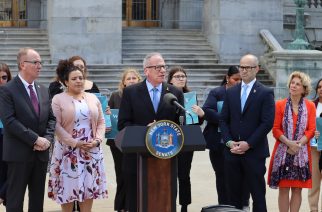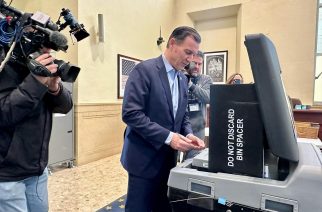
From left, Sen. John Liu, NYPIRG’s Executive Director Blair Horner, and Sen. Brad Hoylman-Sigal celebrate Sunshine Week by announcing four bills that would improve and strengthen New York’s Freedom of Information Law.
Legislators in Albany have introduced four bills aimed at improving New York’s Freedom of Information Law (FOIL). The bills would require state agencies and local governments acknowledge FOIL requests under a stricter deadline and report how they handle requests to assess the state of FOIL.
The proposed legislation would also limit commercial exemptions to FOIL and require agencies to cover attorney’s fees in some cases.
The four bills were discussed at a press conference in the Capitol on March 12, 2024. Additionally, a coalition of more than 30 good-government and transparency advocates sent a letter to Gov. Kathy Hochul and the leader of each of the four legislative conferences explaining the need for the new FOIL improvements.
The first bill, the FOIL Timeline Act (S8128/A8586), sponsored by Senator James Skoufis, D-Cornwall, and Assemblyman Steven Raga, D-Queens, respectively, would create a reasonable time frame for when government agencies need to respond to FOIL requests.
Next, the FOIL Reporting Act (S8671), sponsored by Sen. Brad Hoylman-Sigal, D-Manhattan, would require agencies to report to the Committee on Open Government, all FOIL requests made to them for that year. According to the bill memo, agencies subject to New York’s public officers law are currently not required to report to the Legislature, or to the public, information about how many FOIL requests are received, for what information, and how such requests are handled.
“Under current law, it is impossible to assess the state of New York’s FOIL because agencies are not required to publicly report basic information about how they deal with the FOIL requests they are receiving,” reads the letter the coalition sent to Hochul and the majority and minority leaders in the Senate and Assembly.
“The public must literally FOIL the agency FOIL logs to analyze the state of FOIL.”
The Limiting the Commercial FOIL Exemption Act (S3257), also sponsored by Hoylman-Sigal, would require businesses doing business with government agencies and local government to periodically request FOIL exemptions to protect their “trade secrets.”
In their letter, the groups explain that if a business submits proprietary information to state or local governments, it can have that information exempted from public disclosure indefinitely. In other words, the business can keep what should be public records from ever being released.
“Functionally, this prevents taxpayers from being able to see who is getting their money and what goods and services vendors are providing,” their letter explains. “This bill will require businesses to reapply for the exemption every three years, preventing businesses, vendors, and other third parties from permanently exempting records submitted to the government from disclosure.”
The bill closes a loophole in the law that allows agencies to keep dealings with corporations secret under the false pretense that disclosure of any portion of any of the dealings would somehow hurt the company’s business interest.
Lastly, the Foil Attorney’s Fee Act (S5801-A/A5357-A) sponsored by Senator John Liu, D-Queens, and Assemblyman Phil Steck, D-Colonie, would award attorney’s fees to a petitioner who is successful in a FOIL case.
According to the legislation, the only recourse for the public to address violations of open government laws is through litigation, which is a difficult step for most people to take. New York’s current law makes it harder than other states for a successful plaintiff to obtain attorney fees.
Sen. Hoylman-Sigal said, “We know currently, according to the [New York Coalition for Open Government], that 39% of counties and a staggering 73% of election boards failed to acknowledge FOIL requests made to them within five business days as required by law.”
Hoylman-Sigal is referencing a study by the New York Coalition for Open Government that found in 2022, 72% of towns did not post meeting documents online and 25% of towns did not post meeting minutes.
“[We’re here] to make sure the government here in Albany and throughout the state is held more accountable, has more transparency, and is more easily accessible to all the people of New York,” said Assemblyman Raga. “my bill, the FOIL Timeline Act is going to make it quicker and cap the maximum number of days government agencies can deny or address a request.”
The press conference in March was held during Sunshine Week, which started as a collaboration between journalists and civic groups to promote so-called “sunshine laws” that require public agencies to make their activities and records known to the public.
“We live in representative democracy where the voters give their informed consent to the representative to solve policy problems that plague society,” said Blair Horner, executive director of the New York Public Interest Research Group. “And how can you give informed consent if you can’t get the information?
“New York has great language and its law about the public’s right to access information, but it doesn’t have the policies in place to make it easy to get it,” Horner said.
None of these bills have been passed by the Senate nor the Assembly and only the Limiting the Commercial FOIL Exemption Act has been put on the Senate’s calendar so far.









